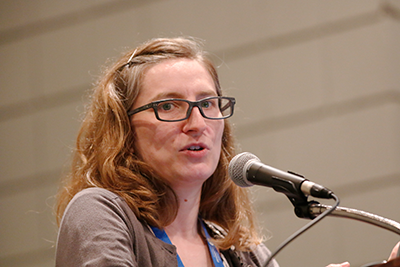Researchers Describe Novel Interventions for Borderline Personality Disorder

“Informing patients about having a diagnosis of borderline personality disorder (BPD) and what it means does not lead to negative consequences,” said Mary Zanarini, Ed.D., this morning at the symposium “Novel Treatments for BPD.”
Rather, patients who receive comprehensive education about BPD show improvement in symptoms and psychosocial functioning, Zanarini said.
She described a randomized, controlled trial in which 80 women who met DSM-IV criteria for borderline personality disorder were randomly assigned either to an internet-based psychoeducation treatment group (n=40) or to the internet-based control group with no psychoeducation (n=40). Recruitment was conducted from July 2013 to March 2015. Subjects participated in 15 assessment periods that were divided into an acute phase (weeks 1 to 12) and a maintenance phase (months 6, 9, and 12).
In the acute phase, women in the treatment group were found to have a significant decline in their scores on all 10 outcomes studied, while women in the control group had a significant decline on seven of these outcomes. Moreover, those in the treatment group reported a significantly greater decline in their impulsivity and a significantly greater increase in their psychosocial functioning than those in the control group. In the maintenance phase, those in the treatment group were found to have a significant decline in their scores on nine of the 10 outcomes studied, while those in the control group had a significant decline in three of these outcomes.
Importantly, the results appear to counter a common clinical apprehension that patients will react negatively to a diagnosis of BPD and full understanding of it. “Those who learn about BPD as well as being told their BPD diagnosis seem to do better symptomatically and psychosocially than those who are told only of their BPD,” Zanarini said.
She was joined at the symposium by Donald Black, M.D., a professor of psychiatry at the University of Iowa. He described a CBT-based group treatment involving psychoeducation and family support for emotional regulation and problem solving for BPD patients in correctional settings. Stephanie Stepp, Ph.D., an associate professor of psychiatry and psychology at the University of Pittsburgh, presented an overview of an early intervention for preschoolers that targets maternal dysregulation in mothers with BPD. Marianne Goodman, M.D., a professor of psychiatry at Mount Sinai School of Medicine, outlined “Project Life Force,” a novel group intervention that targets high-risk suicidal behavior.
Sarah Fineberg, M.D., Ph.D. (pictured above), an instructor at Yale University School of Medicine, described a pilot study to investigate the efficacy of ketamine in patients with BPD. The study will look at its effects on core BPD symptoms and social functioning. Fineberg said there has been a proliferation of ketamine infusion centers across the country, many of which do not assess patients for personality disorders. “I think we need to know the effect this powerful agent may be having on patients with BPD,” she said. She added that animal studies have shown that ketamine promotes neuroplasticity, suggesting that the treatment could help patients make new neural connections and thereby form new patterns of thinking and behaving.
Fineberg emphasized that psychotherapy is and will remain the mainstay of BPD treatment. “We are on fertile ground for developing new treatments for BPD, but as we try new things, we need a strong infrastructure. Psychotherapy is the mainstream; pharmacotherapy would be a supplement.”
(Image: David Hathcox)
|
|
|
|
Advertisement
 |
|
 |
|
|

